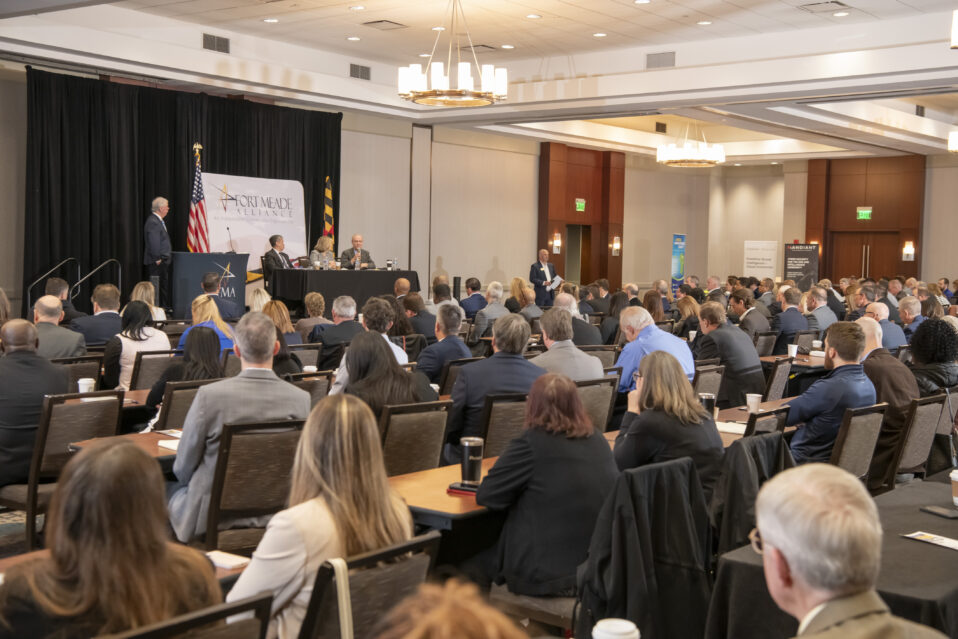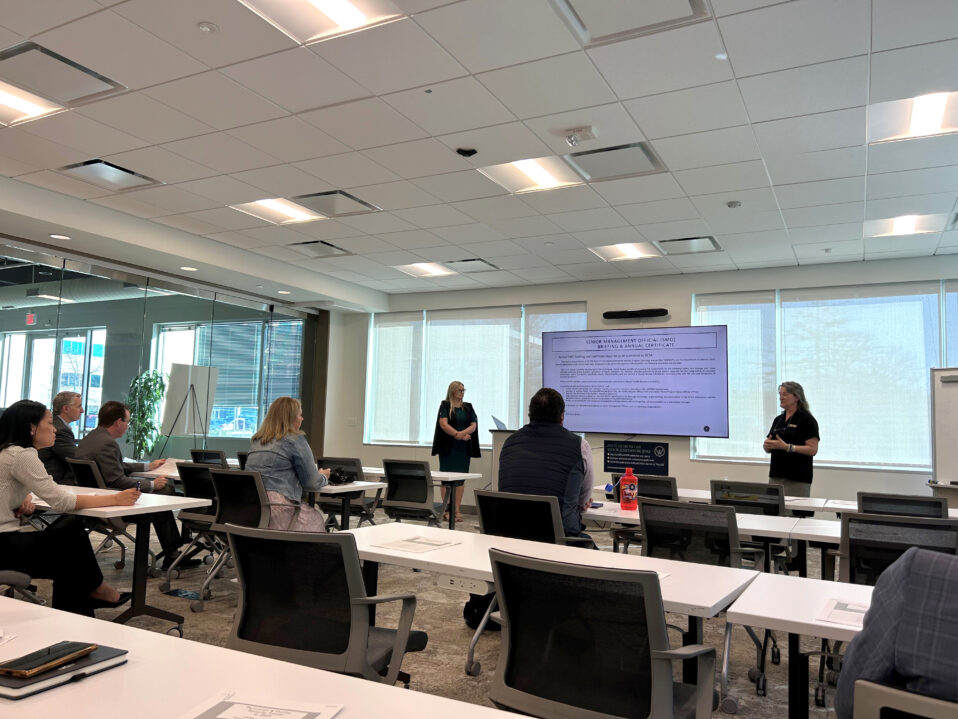
(Left to Right) Moderator: Bill Dunahoo, Praxis Engineering; Panelists: Diane Dunshee, NSA; Doug Packard, DISA and Mike Zwiebel, U.S. Cyber Command
More stable budgeting, advances in missions and new leadership in military commands and federal agencies are having impacts on government contracting. Attendees at the Fort Meade Alliance’s annual Industry Day on March 27 gained insights on some of those impacts from three senior officials – Diane Dunshee, Deputy Director of Business Management & Acquisition and Deputy Senior Acquisition Executive at the National Security Agency (NSA); Doug Packard, Procurement Services Executive and Chief of the Defense Information Technology Contracting Organization for the Defense Information Systems Agency (DISA); and Mike Zwiebel, Acting Command Acquisition Executive for U.S. Cyber Command.
After the CRs
The end of a long stretch of continuing resolutions and Congressional action on an omnibus spending bill and federal budget should enable heightened contracting – and heightened efficiency in the contracting process – over the coming year.

Diane Dunshee, NSA
“The analogy that I have been using about how we operate under a continuing resolution is it’s as if I, for my household, stop every day at 7-11 and do my grocery shopping for the day. I know I am paying more for that convenience and I am buying in small quantity and it is incredibly inefficient from both a time and a dollar perspective,” Dunshee said.
Secured funding for the coming six months and top-line budget figure for FY2019 will enable the NSA to increase its contracting over the next six months and complete that work more efficiently, she said.
More stable funding is providing DISA with expanded opportunities to modernize legacy systems.
Meanwhile, the standup of U.S. Cyber Command included an approval in December 2017 of limited acquisition authority. Through to 2021, Cyber Command will be able to award contracts up to $75 million annually. It will contract additional services through NSA and DISA.
Information Resources
All three organizations are refining their processes for sharing information with the contracting community about upcoming opportunities.
After holding its first industry day in October 2017, Cyber Command is planning to turn this year’s event into an unclassified gathering in order to provide “better visibility” of Command priorities, Zwiebel said.
Cyber Command is also creating a “Dreamworks capability” – an unclassified, collaborative platform where the command can post challenges and the private sector can propose solutions. The venture is designed to enable Cyber Command staff to gain a better understanding of possible technology solutions so they can tailor contracting around those opportunities.
The NSA is reenergizing its strategic planning process and continuing its ‘activity baselining’ program which will generate guidance on priorities and spending. NSA plans to share more of that information at its quarterly industry outreach events.
DISA, meanwhile, is seeking industry input on how it can improve its information sharing.
“If industry days don’t quite meet what you want, tell us what right looks like from an industry perspective,” Packard said. “If we don’t get there all the way, maybe we get halfway there.”
Contracting Processes

Doug Packard, DISA (middle)
Changes to some contracting processes and vehicles are also under active consideration.
At DISA, a Section 809 panel, created through the FY 2016 National Defense Authorization Act, is studying options to modernize acquisitions.
“We are buying products and services in the department as we bought them when I came here in 1988,” Packard said.
For example, synopses of upcoming contract opportunities are ‘snail mailed’ to Commerce Business Daily and then published in paper books – a process that takes 14 days and leaves contractors searching for vital information without the help of any digital search tools.
“We have a process that was built in the Cold War era that absolutely does not meet what we need to do today,” Packard said. “That Section 809 panel is being aggressive. They are thinking outside of the box, they are questioning current laws and processes… Now is the time to engage and make your thoughts known.”
The new contracting office at Cyber Command is searching for contracting processes and vehicles that will enable the command to acquire new and rapidly changing technology.”

Mike Zwiebel, U.S. Cyber Command (right)
“Really what is important to us is the speed and agility at which we can do capability development. I want to be able to develop things quickly and be able to adapt as technology adapts,” Zwiebel said. “Technology changes so rapidly. How can we adaptively contract for those capabilities, and not just buy it and put it in place, but continue to advance it.”
NSA is evaluating possibilities for awarding more completion contracts. However, that effort is hitting some obstacles.
“We just had a program review where the program managers made a statement that we had to revert to level of effort because the completion task would have cost 100 percent more than what we were paying,” Dunshee said.
Such price differences, she said, don’t make sense and reflect shortcomings in the contracting process that need to be resolved.
Staffing Challenges
The competitive labor market is gradually changing where government agencies and contractors source their staff.
“I am agnostic as to where an individual has their desk,” Packard said. “There clearly is competition within the national capital region [for talent]… I’m not going to fight the battle and I’m not going to pay a price premium when I can go somewhere else and get the same level of expertise.”
NSA is looking at locating its staff and contractors at a greater distribution of sites across the U.S.
“We have looked at other hubs across the country,” Dunshee said. “Where are the places that folks with cyber and STEM skills want to work? How can we leverage that to increase the size of our available workforce?”
At the same time, NSA is set to take occupancy of a new building on Fort Meade’s East Campus in a few months and plans to construct additional buildings on post.



